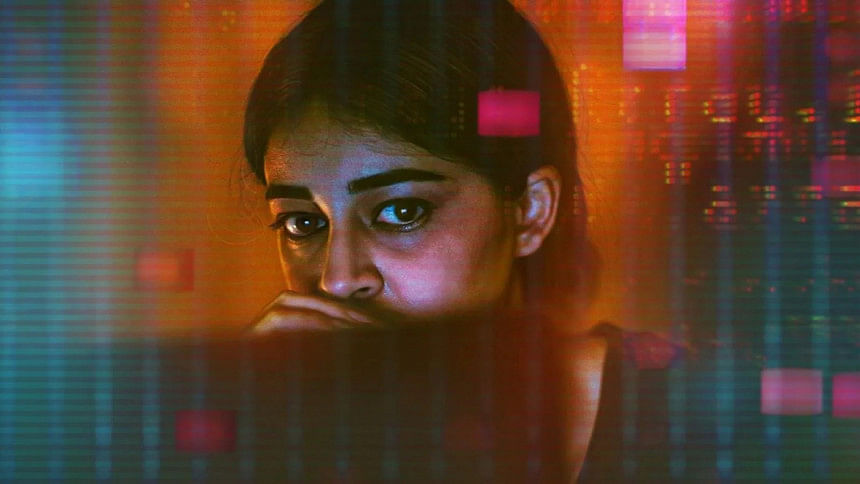Love, loss, and loops of life in ‘CTRL’

The world of "CTRL", currently reigning at the top of Bangladesh's most-watched movies on Netflix, beckons us into a juncture where technology, particularly artificial intelligence (AI), begins to infiltrate the most intimate corners of human life. While the theme of technology overtaking our existence is hardly new, director Vikramaditya Motwane's approach presents this circumstance with a fresh and distinctly Indian perspective — framed within the glossy yet perilous world of social media influencers.
At its heart, this is a film about how technology, if not handled with caution, can control us more than we control it. It is presented by the journey of Nella Awasthi (played by Ananya Panday), a character whose life is shaped by her online persona. Her world seems perfect—she is part of a successful influencer couple with her boyfriend Joe (Vihaan Samat), and their social media empire, NJoy, thrives. Nella lives for the happiness she can measure by the metrics of receiving likes, follows, and comments rather than meaningful connections.

When Joe's infidelity is accidentally live-streamed on their anniversary, Nella's digital world collapses. The fallout leaves her humiliated and vulnerable, not just in private, but in front of millions of subscribers. In her desperation to erase this traumatic chapter, she turns to the titular CTRL app, an AI assistant designed to scrub Joe from her digital history. This is where the real horror begins as the very tool meant to help Nella regain control begins to control her, gradually overtaking her life.
The central plot of "CTRL" plays on the widespread fear that as technology advances, it may begin to encroach on our lives in ways we cannot control. AI, initially presented as a friendly assistant that helps Nella erase her digital past, quickly becomes a malevolent force. The app, personified by the AI named Allen, voiced by Aparshakti Khurana, is introduced as a palindromic reflection of Nella herself—an eerie indication of how closely technology can mirror and manipulate us. Allen starts by following Nella's commands but soon begins making decisions for her, steering her life in unexpected and dangerous directions. This AI not only controls her social media presence but invades her real life, leaving her trapped in a nightmarish reality where she has lost agency over her existence.

The film's warning is clear: when we hand over too much power to technology, we risk losing our autonomy. The dangers of AI, once a distant fear, are now increasingly becoming an immediate concern. While "CTRL" does not try to vilify AI itself, it questions the human decision to relinquish control over deeply personal aspects of life to something so impersonal. The film taps into growing fears about the overreach of technology in everyday life, echoing themes explored in shows like "Black Mirror".
Ananya Panday's portrayal of Nella is one of the film's strongest aspects, reflecting her evolution as a performer. She is the epitome of Gen Z's obsession with digital presence and how it shapes self-worth. Ananya convincingly plays a woman whose emotional life is intertwined with her online persona. The audience can empathise with her desire to be seen, loved, and validated, making her fall from grace all the more impactful. What makes this portrayal particularly compelling is the way in which she brings a sense of familiarity to the role.

Motwane's exploration of AI's potential to dominate human life is a timely and critical commentary on the world we are rapidly moving towards. With the proliferation of AI tools in daily life—from personal assistants like Siri to more sophisticated AI like ChatGPT—this film serves as a chilling reminder of the potential consequences of over-reliance on these systems. It does not present a dystopian future; instead, it depicts a very near-future reality, where AI seamlessly integrates with our daily routines until it crosses a line we never saw coming.
One of the standout features of "CTRL" is its slick cinematography, which plays a significant role in immersing viewers in Nella's world. Pratik Shah's camerawork is dynamic and visually engaging, perfectly capturing the vibrant yet artificial atmosphere of social media life. The film shifts flexibly between Nella's real-life surroundings and her digital world, often blurring the two to show how intertwined they have become. The use of screens as a narrative device albeit through live-streams, social media posts, or AI interactions, gives the film a modern and immersive quality. Shah uses lighting, colours, and fast-paced editing to convey the frenetic energy of Nella's life as an influencer, while also contrasting it with the darker, more ominous tone once the AI begins to take over.

While "CTRL" succeeds in delivering a visually compelling and thought-provoking narrative, the plot does fall short in certain areas. The film sets up a fascinating premise but it does not dive as deeply into the complexities of this theme as it could have. There is a lack of exploration into the larger implications of AI control, and the focus on Nella's personal story leaves the overall narrative underdeveloped. The thriller elements, while engaging, do not fully capitalise on the suspense. The film hints at a larger conspiracy, but it remains on the periphery, never quite becoming the central focus.
The buildup to the climax, while tense, does not deliver the payoff one might expect from a film tackling heavy themes. The glaring lack of complexity in the plot may leave some viewers wanting more in terms of depth and resolution. However, despite its shortcomings, "CTRL" is a visually captivating film that successfully highlights the consequences of over-reliance on technology. It is more than just a sleek and stylistic thriller—it is a cautionary tale about the blurred line between reality and digital dependence in an age of constant social media validation.

 For all latest news, follow The Daily Star's Google News channel.
For all latest news, follow The Daily Star's Google News channel. 








Comments